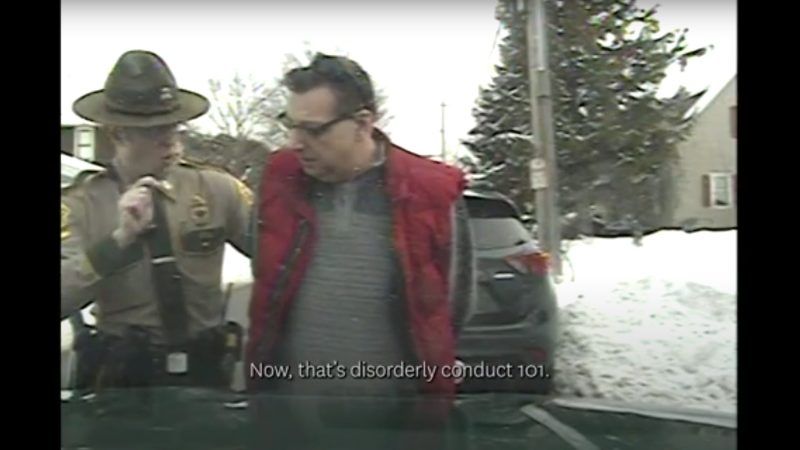Video Shows Vermont State Trooper Arrest Man for Flipping Him Off
FIRE and the ACLU of Vermont are now representing the man in a free speech lawsuit.

Newly released video footage shows a Vermont state trooper arresting a man on disorderly conduct charges for the First Amendment–protected activity of flipping him off.
The Foundation for Individual Rights and Expression (FIRE), a First Amendment advocacy group, released dashcam footage today showing the 2018 arrest of Gregory Bombard, who is pursuing a lawsuit alleging his free speech rights were violated by the arrest.
Bombard was driving through his hometown of St. Albans, Vermont, on February 9, 2018, when he was pulled over by Vermont State Trooper Jay Riggen.
Riggen accused Bombard of giving him the finger. Bombard denied it, but he was incensed about being pulled over for such a trivial matter. "That would be considered freedom of expression, so I'm going to file a complaint against you," Bombard said.
"And you're more than welcome to," Riggen responded. "So here's the issue: Although it may be freedom of expression, it's so unusual that it requires intervention to make sure you don't need help of some kind."
As Bombard's lawsuit explains, Riggen's reasoning was legally deficient. The U.S. Court of Appeals for the 2nd Circuit, which covers Vermont, held in 2013 that the middle finger's "nearly universal recognition" as an insult made it unreasonable for an officer to interpret it as a distress signal.
Bombard tried to continue the conversation, but Riggen concluded the traffic stop and walked back to his car. Bombard was not content, however. As Bombard pulled away, he actually did flip Riggen off.
"It looks like as he pulled away he called me an asshole and said, 'Fuck you,'" Riggen relayed into his radio. "Flipped the bird. I'm going to arrest him for disorderly conduct. There were multiple people around there."
Bombard, represented by the American Civil Liberties Union of Vermont, filed a lawsuit against Riggen and the state of Vermont in 2021. According to his suit, the local prosecutor twice tried to charge him with disorderly conduct—it was dismissed both times—and dragged out the case for nearly a year. Bombard's car was towed because he was pulled over in a no-parking zone, and his mugshot was distributed by the state police.
FIRE has now joined Bombard's legal team and is asking the Superior Court of Vermont to "recognize Bombard's First Amendment rights were violated."
"I respect the police and other first responders," Bombard said in a FIRE press release. "But I respect officers who first respect the Constitution. Those who betray their oath have to be held accountable."
There is, in fact, a significant body of First Amendment and Fourth Amendment case law generated by police retaliating against people who hurt their feelings—most of it firmly upholding the right to hurl choice words or gestures at public officials.
The U.S. Court of Appeals for the 2nd Circuit ruled in 2013 in favor of a New York man who sued after he was arrested for disorderly conduct for flipping off a cop. The court held that the "ancient gesture of insult is not the basis for a reasonable suspicion of a traffic violation or impending criminal activity."
Other circuits have come to similar conclusions. In 2021, the U.S. Court of Appeals for the 8th Circuit denied qualified immunity to a Minnesota police officer who pulled over and arrested a man for flipping her off. The 6th Circuit first upheld the free speech right to shout "fuck you" and flip off a police officer from a moving vehicle in 1997, drawing on the Supreme Court's famous 1971 decision in Cohen v. California, which upheld the right of a man to wear a jacket that said "fuck the draft" into a courthouse.
Of all the types of speech guarded by the First Amendment, criticism of government officials is among the most strictly protected, even when it is vulgar. As Supreme Court Justice William J. Brennan Jr. wrote in 1987, in a ruling striking down a Houston ordinance that made it unlawful to oppose or interrupt a police officer, "The freedom of individuals verbally to oppose or challenge police action without thereby risking arrest is one of the principal characteristics by which we distinguish a free nation from a police state."
Nevertheless, cases like Bombard's continue to pop up where officers seem to mistake the former for the latter.


Show Comments (35)